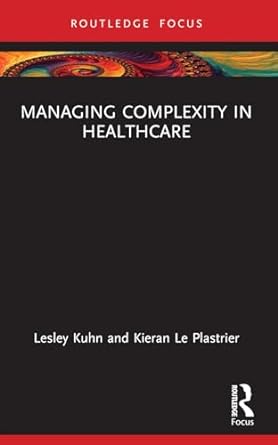Go back


Managing Complexity In Healthcare(1st Edition)
Authors:
Lesley Kuhn ,Kieran Le Plastrier

Cover Type:Hardcover
Condition:Used
In Stock
Include with your book
Free shipping: April 04, 2024Popular items with books
Access to 3 Million+ solutions
Free ✝
Ask 10 Questions from expert
200,000+ Expert answers
✝ 7 days-trial
Total Price:
$0
List Price: $24.95
Savings: $24.95(100%)
Book details
ISBN: 1032054158, 978-1032054155
Book publisher: Routledge
Get your hands on the best-selling book Managing Complexity In Healthcare 1st Edition for free. Feed your curiosity and let your imagination soar with the best stories coming out to you without hefty price tags. Browse SolutionInn to discover a treasure trove of fiction and non-fiction books where every page leads the reader to an undiscovered world. Start your literary adventure right away and also enjoy free shipping of these complimentary books to your door.
Managing Complexity In Healthcare 1st Edition Summary: Managing Complexity in Healthcare introduces the ComEntEth (Complex Entropic Ethical) model as an integrated bio-medical and philosophical approach to understanding how people get things done in healthcare. Drawing on the complexity sciences, studies of entropy in living organisms and the ethics of Emmanuel Levinas, healthcare is theorised as energetic relational exchanges between people as entropic and ethical entities that unfold around a central attractor: Reduction in elevated entropy or suffering in patients.Living entities are engaged in a continuous struggle against the tendency to produce entropy. From the cellular to the collective of human endeavours, the tendency of complex systems is to disorder and decay. Yet in the micro-activity of healthcare enterprise, people resist this tendency by expending energy to create order and sustain life. Making sense of how this miraculous work is made possible is the foundation of this book. Through practical examples – from analysis of practitioner burnout, rural and remote healthcare, the functioning of emergency departments, to government, social and institutional responses to the COVID-19 pandemic – this new integral philosophy provides practitioners, managers, policy designers, and scholars an effective way to understand the dynamics of daily processes and practices that link the micro of everyday interactions with the macro-trends of healthcare.
Customers also bought these books
Frequently Bought Together
Top Reviews for Books
Tai Ladeji
( 5 )
"Delivery was considerably fast, and the book I received was in a good condition."










